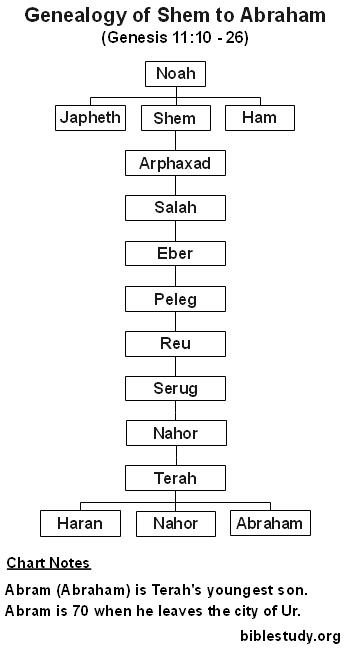Genealogy Fast Facts
The genealogy from Shem to Abraham is the fifth found in the Bible. Preceding it are the lineages of Cain (Genesis 4), Seth (Genesis 5), Japheth and Ham (Genesis 10).
For the eleven post-flood patriarchs from (and including) Noah and Shem to Abraham, the average age at which they produced their firstborn son was 90 years old. If we only include the patriarchs born after the flood, who had children at a much younger age than their predecessors, the average age when their first male child is born is about 43 years.
The average age a firstborn son is produced goes down even further, to just above 31 years old, for the seven patriarchs Arphaxad (Shem's son), Salah, Eber, Peleg, Reu, Serug and Nahor (Abraham's grandfather).

For the eleven patriarchs from (and including) Noah and Shem to Abraham, the average age at death was 374 years. If we exclude those born before the flood (Noah and Shem), who lived significantly longer lives, the average death age drops to just under 286 years. If we narrow the range still further to Reu, Serug, Nahor, Terah and Abraham, the average age at death falls still further to 199 years.
The Greatest Golden Age
There existed a pre-flood golden age of the patriarchs when, from 3095 to 3039 B.C., the first nine patriarchs were alive at the same time!
In 3095 Adam was 874 years old, his son Seth was 744, Seth's son Enosh was 639 and so on. Methuselah, representing the eighth generation of humans on earth, was only 187. Lamech, the ninth generation (and Noah's father), had just been born at the start of this special 56 year period.
There was, however, an even greater patriarchal golden age after the flood. The reason for this, even though lifespans began to greatly decline, was that men began producing their firstborn son at a much earlier age.
Ten generations, during the 118 year period from 2091 to 1973 B.C., were alive at the same time! In 2091 Noah was still alive at the ripe old age of 822. Shem, his son, was 320 and his grandson Arphaxad was 220. The youngest of the bunch, representing the tenth patriarch alive after the flood, was Terah (Abraham's father) who had just been born.
This unique span in Biblical history ended when Peleg, the great great grandson of Shem, died in 1973 B.C. He perished at the age of 239 (Genesis 11:18 - 19). Interestingly, just a few years after this period ended, Abraham was born.
Shem
Shem, two years after the flood when he turned 100, produced his firstborn son Arphaxad (Genesis 11:10).
Shem lived such a long life after the flood that when he died in 1811 B.C. Abraham was 149 years old. Isaac, Abraham's son, was 49 years old and had been married to his beloved wife Rebekah for 9 years.
Abraham the Hebrew
The first use of the term "Hebrew" in the King James Bible is found in reference to Abram (Abraham).
And there came one that had escaped, and told Abram the Hebrew; for he dwelt in the plain of Mamre the Amorite . . . (Genesis 14:13, KJV).
The word translated as "Hebrew" in Genesis 14 is ibriy (Strong's Concordance #H5680). Used 34 times in the Old Testament, ibriy literally means "one from beyond" and is used to refer to a descendant of Eber.
Mistake in Genealogy
The gospel writer Luke records Jesus' lineage through his mother Mary back to Shem, Adam and God. He records in his genealogy, however, something that is not quite correct.
. . . which was the son of Heber (Eber), which was the son of Sala (Salah), which was the son of Cainan, which was the son of Arphaxad, which was the son of Sem (Shem) . . . (Luke 3:35 - 36, KJV).
Luke states correctly that Heber (Eber) was the son of Sala (Salah). He then inserts that Salah was the son of Cainan. The problem is that in the Biblical genealogies found in Genesis 10 and 11 a man named Cainan is NOT mentioned either as the father of Salah or as the son of Arphaxad.
"This Cainan, the son of Arphaxad, and father of Sala, is not found in any other Scripture genealogy. See Genesis 10:24, 11:12, 1Chronicles 1:18, 24, where Arphaxad is made the father of Sala (Salah), and no mention at all made of Cainan." (Adam Clarke's Commentary).
"This Cainan (of Luke 3:36) is not mentioned by Moses in Genesis 11:12 nor has he ever appeared in any Hebrew copy of the Old Testament, nor in the Samaritan version, nor in the Targum; nor is he mentioned by Josephus, nor in 1Chronicles 1:24 . . ." (John Gill's Exposition of the Entire Bible).
Luke likely got his genealogy of Shem, Abraham and the other patriarchs from the Septuagint which has this error. The Septuagint is a Greek-based version of the Old Testament written by Jewish scholars around 285 to 247 B.C. The phrase "which was the son of Cainan" in Luke 3:36 was likely erroneously inserted by these scholars.